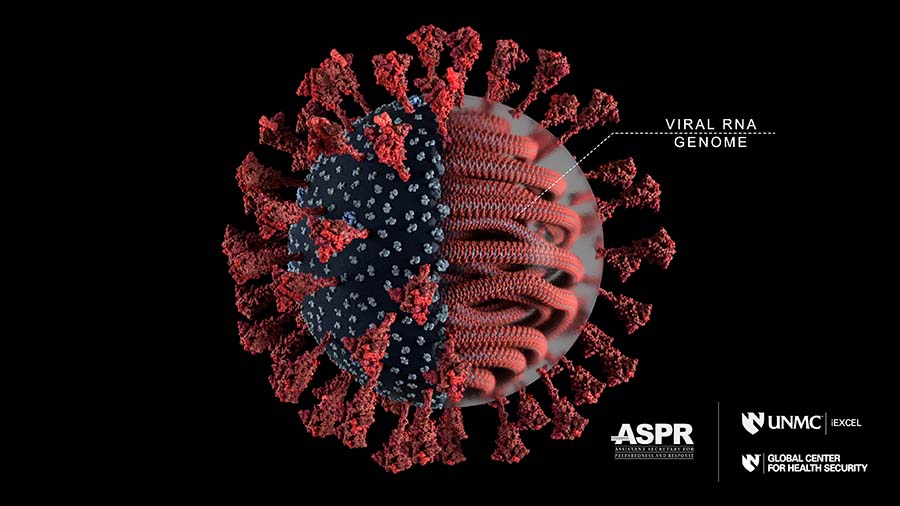New animations show damage caused by COVID-19

SARS Coronavirus 2 with 30,000 nucleotide genome which contain all the viral genes.
The Omicron variant and what you need to know, new video of COVID-19 and its effects in the human body
UNMC infectious disease expert and University of Nebraska-Lincoln virologist to talk Omicron variant
James Lawler, MD, co-executive director of the Global Center for Health Security at the University of Nebraska Medical Center and Nebraska Medicine physician and Peter Angeletti, PhD, virologist and associate professor at the University of Nebraska-Lincoln Nebraska Center for Virology, share insights about the latest COVID-19 variant and what the public needs to know. They also will share new animations about the COVID-19 virus, its ability to infect and replicate, and the damage COVID-19 can do to the human lungs.
Watch the press conference on Facebook, starting at 11 a.m. on December 20.
The Omicron variant of Coronavirus 19 or COVID-19 is the latest of the genetic variants of SARS-CoV-2 spreading around the world. The Omicron variant, identified as B.1.1.529, is more easily spread than the Delta variant and was first detected in specimens collected in November in Botswana and South Africa.
UNMC’s iEXCEL team in the Davis Global Center created the latest animations with Dr. Angeletti, PhD, a virologist and subject matter expert.
Video
- Animation of SARS Coronavirus 2 with 30,000 nucleotide genome. (mp4)
- Animation of coronavirus entering lungs, alveolar sac, coming in contact with epithelial cells (mp4)
- Animation of the Coronavirus entering and hijacking the cell to create hundreds of thousands of virus particles that infect the body (particularly the lungs) and can be transmitted to others. (mp4)
- Animation of cytokine storm, causing damage to the lungs (mp4)
- Volumetric rendering of lungs damaged during Coronavirus infection (mp4)
- Animation of vaccine genome diagram (mp4)
- Animation of the effects of a COVID vaccine – the vaccine develops antibodies that prevent much of the Coronavirus from getting into and infecting the cells. (mp4)
- Animation of the "swiss cheese" layers of protection (mp4)
Images
-
Coronavirus in alveolar sac, coming in contact with epithelial cells (jpg)
-
The coronavirus S protein interacting with ACE2 receptor (jpg)
-
Cytokine storm, leading to alveoli becoming filled with mucus and dying white blood cells. (jpg)
-
Volumetric rendering of damage to lungs from Coronavirus (jpg)
Video/audio soundbites
James Lawler, MD, University of Nebraska Medical Center and Nebraska Medicine infectious diseases physician co-executive director of the Global Center for Health Security at UNMC
- What is the risk with omicron? (0:17)
Video (mp4) | Audio (mp3)
We’re at significant risk because we have a relatively low percentage of our population that is fully vaccinated and boosted which is necessary to prevent transmission and so I think we're at risk for a very large outbreak of omicron in the coming weeks. - What do we need to protect ourselves from sickness and death from COVID and the newest variant, omicron? (0:27)
Video (mp4) | Audio (mp3)
Everybody who has not been vaccinated yet – please, please, go out and get vaccinated. We know that vaccinations reduces severity of illness, and it appears that’s the case with omicron as well. It’s also true that vaccination that’s recent and boosting for people who have been fully vaccinated previously probably reduces transmission of omicron from person-to-person. - Are there any treatments that work for omicron? (0:27)
Video (mp4) | Audio (mp3)
It’s possible that only one of the currently available monoclonal antibody treatments in the U.S. will have retained effectiveness against omicron. It does appear that remdesivir -- the antiviral drug we’ve used is probably still effective against omicron and some of the newer antiviral drugs that we don’t yet have on the market in our health care settings might be effective but we don’t have data yet.
Peter Angeletti, PhD, associate professor at the University of Nebraska-Lincoln Nebraska Center for Virology
- What do we know to date about omicron as far as a virus? (0:16)
Video (mp4) | Audio (mp3)
And what we’re learning lately about omicron is that it is replicating much faster than Delta does so obviously people at the CDC are watching it very carefully but we know is that the best thing to do to be prepared is by vaccinating yourself. - Will there be more mutations -- since now we’re seeing this third COVID mutation? (0:16)
Video (mp4) | Audio (mp3)
I think yes, it’s a virus and therefore there will be more mutations but the answer is always the same regardless of how many mutations happen, we just need to protect ourselves by doing the right things – vaccine and masking and all of that.